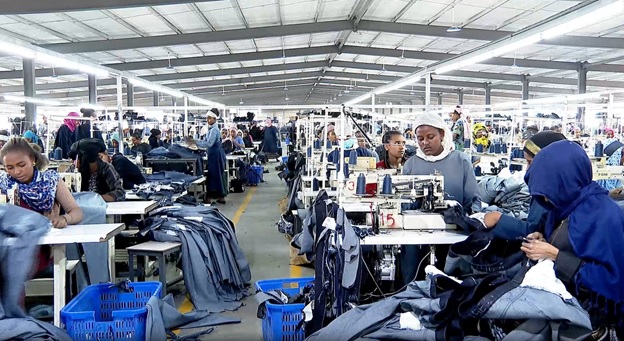
Various efforts are being made to alleviate the problems of manufacturing enterprises and to increase their role in the process of structural economic transformation. Among the activities are efforts underway that enable enterprises create mutual relations and market linkages. As part of this effort, a national exhibition and bazaar of manufacturing enterprises aimed at revitalizing manufacturing enterprises, called “Our Product”, was held from December 13 to 17, 2023 in Addis Ababa under the theme of “Let Ethiopia produce and we purchase “.
At this exhibition and bazaar, more than 85 manufacturing enterprises performed the activities of selling and promoting their products and making agreements that enable them to work together; they also participated in panel discussions about the sector’s activities.
According to the Director General of Ethiopian Enterprise Development, Ambachew Nigussie (PhD), the exhibition and the bazaar have great benefits in terms of product supply and promotion, market linkages and experience sharing. The exhibition was a big platform where more than 85 manufacturing enterprises participated and more than 50 thousand visitors attended.
In order to increase the competitiveness of manufacturing enterprises, it is necessary to facilitate market opportunities, and in this regard, many efforts have been made for enterprises to benefit from the market in the past years. While explaining about the multifaceted benefits of the exhibition, he said; “The exhibition will help manufacturers to provide quality and competitive products and the society to contribute to the development of the national economy by using local products. In addition to selling product, it helped enterprises to exchange experience and work together. It also showed the sector’s development level.”
According to the Director General, efforts are being made to improve the performance of the manufacturing sector in import substitution; supplying to the foreign market, and creating a wide range of employment. In the past few years, especially with the attention given in connection with the homegrown economic reform program, it has been possible to record encouraging results. Thus, in the past five years, the number of enterprises has increased to more than 26,000 and more than 570,000 jobs have been created through the activities carried out to establish and strengthen small and medium-sized productive enterprises. This indicates that more than 100,000 jobs are being created every year.
In addition, in the last five years, more than 15.5 billion Birr has been made available for business operations and more than 14.3 billion Birr for production equipment loans to solve the sector’s financial problem. This shows that more than six billion Birr has been provided to the sector every year.
He recalled that Ethiopian Enterprise Development was established in a new form by the Council of Ministers’ Regulation No. 526/2023 to lead and support the manufacturing enterprise; to prepare among others; the sector’s road map, operational guidelines and manuals in a new form and use. They are working closely with the stakeholders to improve the previous ones and confirmed will continue to strengthen the large-scale activities that have started to develop operating systems that can produce better results by facilitating critical support and creating opportunities for citizens to be engaged in the manufacturing enterprise sector.
According to Melaku Alebel, Minister of Industry, the platform will help to increase the role of small and medium industries in the process of expanding the country’s economic base and enabling strong and sustainable growth. To bring manufacturers closer to consumers and stakeholders; to solve the bottlenecks of the sector and by showing the quality level of the country’s products, it will increase the purchasing power of the buyers.
In addition, by removing unnecessary players from the trade chain and providing products at affordable prices, it will reduce the cost of living; create a reliable market for producers; and thereby create job opportunities; attract new industries and strengthen existing ones; and bring many benefits. In particular, it will play a major role in reducing the country’s dependence on foreign production gradually, and will greatly increase the culture of citizens to use their country’s products, he said.
Melaku mentioned that the government has designed a ten-year development plan based on the homegrown economic reform program and is making great efforts to build a sustainable and competitive economy by paying special attention to the five economic sectors (agriculture, manufacturing, mining, tourism and information technology). Many activities have been carried out to ease the bottlenecks in the manufacturing sector and encouraging results have been recorded.
According to him, the policy direction of the sector has been reformed along with implementing strategies. Among these strategies are leather development, capacity building, import substitute products, and communication strategies to fill the perception gap in the sector.
The strategies and guidelines are policy implementation frameworks designed to address operational bottlenecks. Work has been done to identify what kind of guidance each sector needs. These strategies were prepared on the premise that ‘if the current problems cannot be solved based on research, the sector will collapse completely’. He realized that the issue of using/not using the strategies is a matter of improving/not improving the performance of the manufacturing sector, so that the strategies should be implemented with full capacity to provide lasting solutions to the sector’s problems.
In order to solve the coordination problem in the sector, an industrial movement based on the experience of other countries as well as Ethiopia’s future vision, promising results have begun to be achieved. In particular, bringing back industries that had been closed for more than five years and creating employment opportunities for 10,000 citizens is considered to be no less successful than establishing new industries.
More than 370 small to high level industries have been brought back to production. It has been possible to produce import substitute products worth more than 2.3 billion Birr per year. This has created more job opportunities, allowing new manufacturers to start operations.
It has been decided to raise the loan rate from 12% to 24%, which was previously offered to the manufacturing industry. Foreign investors who can supply inputs to local producers in industrial parks are allowed to create up to 100% input linkages and support small and medium producers. Guidelines have been implemented to increase the participation of domestic investors in industrial parks. A special procurement direction has been given for government institutions to make transactions from local producers so that local producers do not face market linkages.
Unfavorable guidelines for the supply of foreign exchange are constantly being revised and great efforts have been made to create favorable conditions for the development of the sector. Leadership at all levels has been able to pay attention to the sector and make it work.
According to Melaku, import substitution of the manufacturing sector is expected to grow from its previous 30% domestic market share to 65% in the coming years, and from its current low performance (400 million Dollars per year) to nine billion Dollars. In terms of job creation, a direction was set to create job opportunities for five million citizens in the sector. A big goal has been set to increase the production capacity utilization to 85 percent from the current level.
“Achieving these and other plans in the sector will enable the national economy to bring about a structural transformation, so it is necessary to follow a different way to achieve the goals. The sector has wide opportunities and the results of its implementation have shown that it is possible, but there are issues that require the support of all stakeholders in the future,” Melaku said. He emphasized the need to improve government service delivery, increase financial availability, solve resource supply problems and improve infrastructure provision.
According to him, since lack of quality of service affects competitiveness of the industries, it is necessary to improve efficiency problems at all levels in the provision of government services and solve them in a sustainable way so that small and medium industries can expand.
As the manufacturing sector has high financial needs, access and affordable financing should be done. In particular, commercial banks should follow a direction that eases the financial problems faced by small and medium enterprises, as there are many gaps in this area.
Resource availability issues should be resolved through strong linkages. As industries need electricity, space, water, roads, logistics and other infrastructure in particular, the commitment and cooperation of all government bodies is necessary to solve the shortage of these services in a sustainable manner. In order to solve these problems, it is necessary to make the “Ethiopia Tamirt” movement more effective and strengthen the established clusters, so all institutions should fulfill their responsibilities, the Minister said.
Habtamu Shiferaw, Product Manager of “Colba” Leather Factory, said that such platforms have a positive contribution to market linkages. “The exhibition and the bazaar helped us find a market. It helped to understand the needs of the consumer and to look at the work of other manufacturers.
Stating government’s support is insufficient; Habtamu said that there is a serious foreign exchange problem. According to him, leather factories require a lot of chemicals and machinery; foreign currency is also needed to import chemicals and machinery. Currently, the leather factories in the country are weakened due to lack of foreign exchange.
In addition, a lot of work needs to be done to maintain the quality of raw hides and skins. “The government should do extensive awareness raising activities through the media. Improving the quality of raw hides and skins will increase export competitiveness. Habtamu said.
BY BACHA ZEWDIE
THE ETHIOPIAN HERALD FRIDAY 29 DECEMBER 2023



